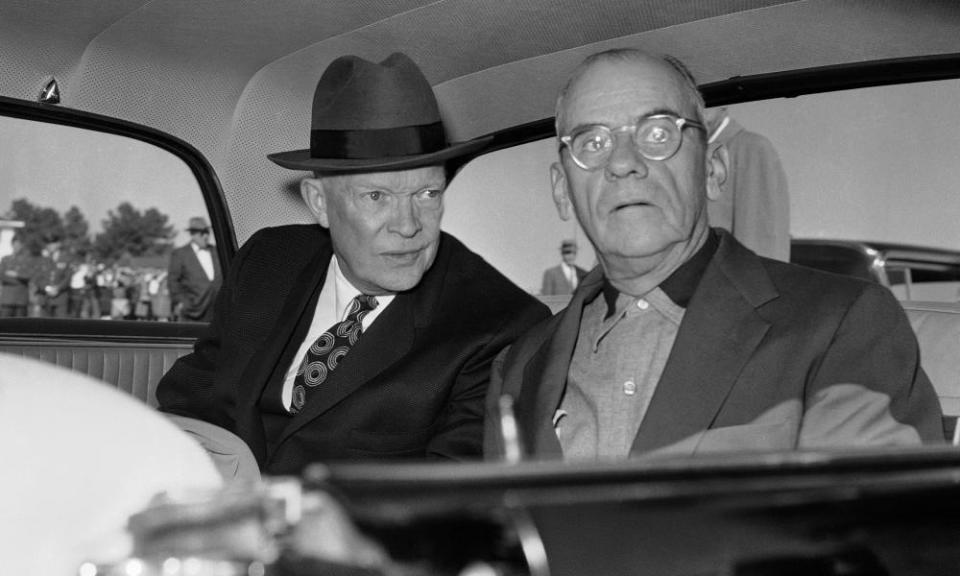‘The Masters is my life’: the forgotten Augusta legacy of Philip Wahl Sr
Tucked away in a corner of YouTube sits the kind of cheesy 1976 sales pitch Augusta National had to make to Asia decades before Hideki Matsuyama came along. Cigarettes, whisky and terrain far less manicured than is the case for Masters of this day and age feature. So, too, Philip Russell Wahl Sr.
“We have had the finest group of players, the greatest competitors, on our golf course,” says Wahl. “That’s what makes the Masters great.” And then the payoff: “The Masters is my life.”
Related: Hideki Matsuyama is Japanese but his victory matters for Asian Americans
There is a painful irony attached to that parting shot. On 15 September 1978, six days after his 43rd birthday, Wahl was killed when the vintage MG he was driving on Berckmans Road, yards from the gates of Augusta National, offered little protection in a head-on smash. The 16-year-old driver of the other car, later found to be under the influence, survived but his 13-year-old passenger was also killed.
Wahl had been the general manager of the golf club since 1961, since which time it had risen substantially in the global consciousness. Palmer, Player, Nicklaus, Watson: the winners of the major from that bygone window illustrate what heady times they were. The head of Tokyo’s main broadcasting outlet, now a key Masters partner, was among those to send condolences to Wahl’s family.
It feels sad that Wahl’s dedication and contribution to the Masters have vanished from view during the intervening 43 years, not least because of the tragic circumstances of his death. His wife, Janice, is now 82 and being cared for in a nursing home.
In late 1961, as a 26-year-old, Wahl had called his wife in Ohio with the heady news that Bobby Jones and Clifford Roberts wanted him to run Augusta National. There was just one catch: he had to start the next day. In his covering letter to Jones and Roberts, Wahl had stated: “I am certain of my capability to maintain the high level of standards of operations, based upon excellent experience in clubs highly esteemed in this area. I have a genuine desire to please membership as well as operators. My background has been in clubs which strive toward culinary and operational perfection. I enjoy the inherent satisfaction of pleasing even the most discriminating people.” And of course, at that stage Wahl would have been dealing with precisely the same.
By 1963, Wahl was fiercely defending Augusta’s status. The New York Herald-Tribune columnist Jimmy Breslin mused: “How Augusta, GA, can have anything is beyond us. Staying in this town is just like serving a sentence.” Wahl fired back: “If you want to go to a big city, you go to New York. But if you want to see golf, you come to Augusta. What Breslin wants is instant tradition, and you just can’t make it in two or three years.”

Other stories are eye-catching. When Dwight Eisenhower, an Augusta regular, decided he wanted free from the shackles of the clubhouse, he and Wahl headed into town. The problem was they didn’t alert the accompanying secret service, who in a panic soon discovered Ike and his friend munching pizza and drinking beer in Squeaky’s Tip Top on Central Avenue. Roberts, known for his hard-nosed approach to life and particularly his golf club, wrote on a striking note on a portrait photograph gifted to Wahl: “For Philip R Wahl. The best club manager Augusta National ever had or expects to have.” It is dated 11 April 1977. Roberts killed himself months later, by the side of Ike’s Pond at Augusta National.
It is outside the perimeter of the club where I have a chance meeting with Phil Wahl Jr, who lives less than three miles from where the 85th Masters was rumbling towards conclusion. What he doesn’t know about Augusta National doesn’t seem worth concerning one’s self with.
“All my memories of my father involve Augusta National – we called it ‘the club’ – and his job there,” he explains. “During the summer, the course was closed. As children, we would head there and not just for the golf. I used to work with the maintenance crew, helping out in the sheds. It was such a part of our family’s life, none of this was a big deal for us.”
Related: Gary Player’s apartheid history is not quite as smooth as his Augusta retelling | Andy Bull
Wahl was 14 when he lost his father. “I don’t even care to note who he is,” he says of the driver of the other car. There have been years of solace, linked to some incredible memorabilia, in the contribution Wahl Sr made to this epic event. Young Phil was around the clubhouse at the Masters from the age of eight, taking on official – and paid – duties as a runner from 13. When you are a child delivering a Green Jacket to the Butler Cabin before presentation to Gary Player, the world must feel a happy place.
Bill Lane, who succeeded Roberts as Augusta’s chairman, has promised to “look after” Wahl’s family in respect of Masters access. After Lane’s own sudden death, policies became stricter and firmer under Hord Hardin. Phil Wahl Jr takes the understandably cautious approach when it comes to such matters but the rest of us can scratch heads that he is not, as a matter of routine, a Masters guest.
“I have always felt very comfortable with the relationship we have had,” he says. “There has never been any animosity. I respect that decision and have respect for the stand there. One day I hope to get on a list or have access to the tournament my father was so significantly involved in during the years where it became a worldwide phenomenon.” His father’s role surely merits more recognition.

 Yahoo Finance
Yahoo Finance 